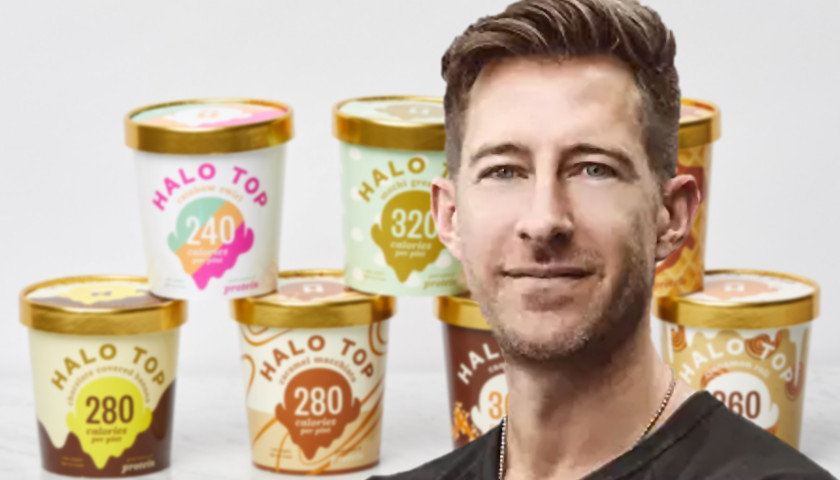by Brittany Hunter
No one expects healthy desserts to taste good. It is one of life’s harsh realities that we have had to learn to live with: you can either eat healthy food, or eat delicious food; you can’t have it both ways. But that was before Halo Top entered the market and was met with unconventional success.
Visit any grocery store that sells the healthy protein-packed ice cream in the late afternoon or evening hours and you will see empty shelves where the beautiful gold-lined pints once stood. So high in demand are these low calorie, low fat, low sugar ice cream flavors, large supermarket chains can barely keep up with the consumer demand.
But unlike many successful brand name products, Halo Top comes from humble origins. In fact, its creators had to overcome some major obstacles and wait six years before they achieved market success. And what is perhaps most intriguing about Halo Top is its refusal to do things in the traditional way. But it is this innovative mindset and the ability to learn from mistakes that has helped Halo Top reach the top.
Changing the Way We Eat Ice Cream
For many of us, ice cream is a treat reserved for “cheat” days, but certainly not something to be eaten on a daily basis. But Halo Top’s healthy approach to ice cream is changing the way consumers eat the deliciously cold treat. That is because each pint of the heavenly snack only contains 220-240 calories. Compare this to a brand like Ben and Jerry’s which has about 1,040 calories per pint and you can see why consumers get so excited about it.
Since Halo Top also tastes great, something no other diet ice cream has pulled off, consumers are actually eating a pint of this ice cream every day. But since the calories are so low, they needn’t feel guilty for eating an entire container in one sitting. In fact, its packaging encourages you to “stop when you hit the bottom.”
This also means consumers are coming back for seconds and thirds with more frequency than any other ice cream brand before it, which would explain why grocery stores are having a hard time keeping inventory in stock. And this is precisely what its creator Justin Woolverton had in mind when he created his recipe.
A fan of low carb diets and intermittent fasting, Woolverton wanted a cold treat that he could eat while still abiding by his diet. And like all great market products, Halo Top was born out of a demand for a product that didn’t yet exist.
Originally using greek yogurt and fruit as his main ingredients, Woolverton began experimenting with recipes. He quickly discovered that his “healthy” ice cream tasted like garbage. But he refused to give up.
As with most successful products, it took several rounds of trial and error before the product resembled anything close to ice cream. But like any good entrepreneur, he was consumed with perfecting the recipe, until he was so excited about it, he could hardly sleep.
Gasping for Air
But what is perhaps most notable about Halo Top is its secret ingredient: air. And oddly enough, in the process of building the Halo Top brand, lack of air almost killed, not only his product, but Woolverton himself.
After moving to a commercial kitchen, Woolverton realized that simply multiplying his recipe by 50 wasn’t going to work. The consistency was all wrong. So in order to keep calories low, Woolverton simply added more air through a process called “overrun.” But this process isn’t necessarily unique to Halo Top. Every name brand ice cream uses this process to lesser degrees. Though most are not worried about keeping calories low, so they are able to add other ingredients to play around with the consistency, which requires less air than what is needed for Halo Top.
Getting this process just right took a great deal of time. But the mark of a good entrepreneur is the inability to settle for mediocrity. Woolverton continued to perfect his recipe for an entire year before he was satisfied. And even after the ingredients were finalized, he found his ice cream was still rock solid, not replicating an authentic ice cream experience. However, he found that if left out for only a few minutes, the consistency was almost identical to regular ice cream.
But a perfect recipe didn’t equate instant market success. After all, he still had to convince the stores to buy what he was selling. Healthy ice cream doesn’t have a great track record and most are discontinued shortly after they are released. In fact, INC’s profile of Halo Top lists several other attempts at healthy ice cream that were each dismal failures.
As a one-man operation, Woolverton was doing everything: creating the recipes, convincing stores to stock Halo Top, and even driving the shipments himself. And it was this that almost killed him.
In order to preserve Halo Top’s consistency while it was en route to its destination, large amounts of dry ice were needed. His car was packed with 40 pints of Halo Top stored in dry ice. And, as is typical for Southern California, severe traffic meant spending a lot of time trapped in his vehicle. Unfortunately, it did not occur to him that the dry ice is a solid form of carbon dioxide that sublimates as it warms up. After almost passing out behind the wheel, he flagged down a nearby ambulance and a major crisis was averted. But his determination was not shaken.
But his solo operation would not be solo for long. Douglas Bouton, a friend of Woolverton, was done working in the legal profession and was ready for a change. Bouton became the primary “seller,” going to health food stores and asking them to sell their product. After several visits, they signed a few local stores as well as various Whole Foods Markets. Halo Top was well on its way to becoming a household name.
Unconventional Methods
But as successful as their ice cream brand would later become, in 2013 things weren’t looking so hot for the duo. Having already borrowed $500,000 from friends and family, Bouton and Woolverton realized they were running out of chances to make this work.
For smaller companies like Halo Top, selling their product in a major grocery store chain means having to pay to do so. In many cases, this can cost up to $150 per flavor. And while this might not seem like a huge cost on its own, it ended up costing the two entrepreneurs hundreds of thousands of dollars just to get their ice cream on the shelf, without any guarantee that anyone would actually buy it.
Having maxed out several credit cards and exhausted all other methods, they decided to try crowdsourcing, which has cleared many hurdles that stand in the way of innovators and entrepreneurs gaining access to capital. Through crowdsourcing, loyal fans of Halo Top could pitch in money to help the struggling company. This resulted in around $1 million for the company, which had promised this would be their last attempt before giving up.
Since money was tight, they couldn’t rely on traditional ad campaigns to promote their product. Instead of commercials airing at prime times, the two utilized social media. Calling on fitness buffs with large Instagram followings, Halo Top was able to get its name out there. Since they couldn’t afford to pay for ads, they traded promotion for ice cream coupons. Eventually, this caught the attention of GQ, whose 2016 write-up of the company elevated it to the next level in the nick of time.
Three months later, the two former lawyers had doubled their revenue and were making a profit.
They say imitation is the best form of flattery, and if this is true then Woolverton and Bouton should feel very flattered indeed. Over the last year, name brand ice cream companies, blown away by Halo Top’s success, have launched their own “healthy” ice cream lines. But like all great entrepreneurs, Woolverton and Bouton knew they had to innovate to stay ahead of the competition.
Late last year, Halo Top started branching out and offering non-dairy alternatives of their classic flavors. All this was in addition to adding new flavors to their line as well. But the most fascinating aspect of Halo Top’s branding is its cult following.
The low carb diets have stuck around as many have discovered they do not have to sacrifice taste for a smaller waistline. And when you think of healthy ice cream, you think of Halo Top. Starting a campaign on Instagram featuring fit people showing their bare midriffs while eating Halo Top was a huge success and has helped consumers associate Halo Top as the only healthy ice cream. This has allowed the company to keep an edge on their competitors, even though they are facing huge names like Breyers and Ben and Jerry’s
And as far as keeping overhead costs low is concerned, if you’re searching for the Halo Top headquarters you won’t be able to find it because it simply doesn’t exist. Each of Halo Top’s 75 employees works remotely. Utilizing the work platform Slack, they are able to keep in touch. When needed, they rent out space from WeWork for a physical staff meeting. This is just another aspect of the company that has allowed them to stay afloat in a sector formerly ruled by big brand players.
It may have taken six years for Woolverton and Bouton to become household names, but I am sure they would both agree that it was well worth the wait. And for those of us who can now eat ice cream without the guilt, Halo Top has been a life-changer. In fact, I ate an entire pint while writing this article.
– – –
Brittany Hunter is an associate editor at FEE, who studied political science at Utah Valley University with a minor in Constitutional studies.
First published at the Center for Individualism and reprinted with permission from FEE.org





